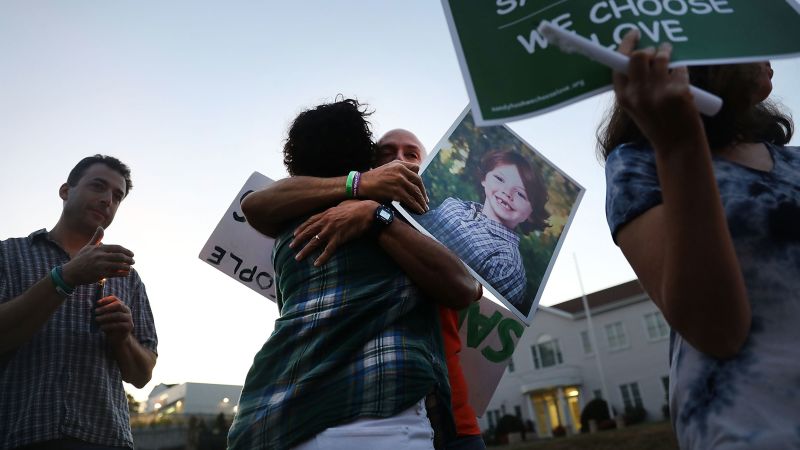Editor’s Note: Watch CNN’s Special Report “Sandy Hook: Forever Remembered” with Alisyn Camerota tonight at 10 p.m.
CNN
—
They were living ordinary and full lives in the small New England town of Newtown, Connecticut, unprepared for the devastation that would unfold and occupy the rest of their days.
Mark Barden was a professional musician. Nicole Hockley had recently arrived in Newtown after a corporate marketing career in the United Kingdom.
On the morning of December 14, 2012, after killing his mother, an isolated and violence-obsessed 20-year-old with unfettered access to firearms shot his way into Sandy Hook Elementary School. Over the course of 10 minutes, he shot and killed 20 first-graders and six adults before ending his own life.
The lives of Daniel Barden, 7, and Dylan Hockley, 6, were among those cut painfully short that day. But in the long decade since, their spirit and memory have lived on in their parents’ devoted advocacy for safer communities.
A month after the shooting, Mark Barden, Nicole Hockley and other parents who lost children that day launched Sandy Hook Promise, an organization dedicated to protecting children from gun violence.
“I didn’t know what the change would be, but we would be part of it,” Hockley recently told CNN’s Alisyn Camerota for the CNN Special Report “Sandy Hook: Forever Remembered” airing on the 10-year anniversary of the tragedy.
The Sandy Hook Promise group first set its sights on gun reform. Along with other families, they sought bans on AR-15 assault-style weapons and high-capacity magazines, both of which were legally purchased by the shooter’s mother and used in the Sandy Hook attack.
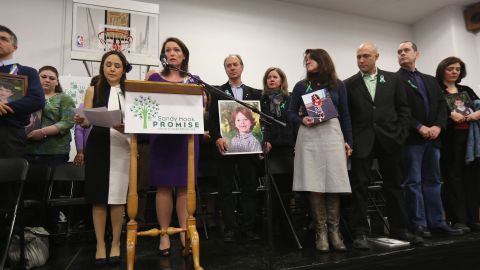
“There were a lot of guns that our shooter could have chosen,” Hockley said in February 2016. “He chose the AR-15 because he was aware of how many shots it could get out … (and) that it would serve his objective of killing as many people as possible in the shortest time possible.”
Barden, Hockley and other Sandy Hook families found a sympathetic partner in John McKinney, their state senator and the highest-ranking Republican in Connecticut politics at the time.
“My immediate thoughts in terms of my role in the aftermath was, ‘I need to do, and I will do, anything humanly possible to help these families,’” McKinney said. “[I] met with all of the other Republicans in our caucus, and I was very honest with them. I said, ‘I’m going to go negotiate and work with the Democrats.’”
After months of meetings with victims’ families, town halls in the Newtown community and consultations with experts, McKinney and his colleagues unveiled their proposed legislation on April 1, 2013.
When then-Governor Dannel Malloy signed the bipartisan bill three days later, Connecticut had enacted some of the most sweeping gun legislation in the country. The new law expanded the state’s assault weapons ban and banned the sale of high-capacity ammunition; required a state-issued permit to purchase any rifle, shotgun or ammunition; and created the country’s first registry of individuals convicted of an offense with a deadly weapon.
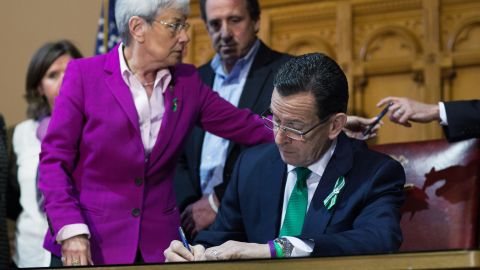
Since 2013, Connecticut is the most populous state without a mass shooting of four or more fatalities, according to a CNN analysis of the Gun Violence Archive.
A defeat paves the way for success
The Sandy Hook Promise parents set their sights on Washington, DC, to see if their home state’s success could be replicated on the federal level.
“We approached the Connecticut legislature with love and logic, and they listened,” Hockley said in a 2013 speech introducing President Barack Obama. “I believe that with that same approach of love and logic, Congress will be persuaded to act.”
In April 2013, National Rifle Association-endorsed senators Joe Manchin, D-W.Va., and Pat Toomey, R-Penn., proposed a joint recommendation that would have required criminal background checks on people purchasing firearms at gun shows and online. The policy, known as universal background checks, was supported by more than 80% of Americans, according to a Pew Research poll taken at that time, giving the newly minted leaders of the gun reform movement reason for hope.
“I just thought, ‘OK,this is pretty simple. This is basic. This is what everybody wants. Let’s just get that done,’” Mark Barden said.
Most Republican senators and five Democrats saw things differently, however, and the bill fell six votes short of the threshold needed to break a filibuster.
The bill’s failure struck the families as a disappointment and a betrayal: Barden and Hockley both say multiple senators claimed to stand with them, then voted against the bill. But the two advocates found lessons in defeat and vowed that day to double down on gun violence prevention.
“We’ve always known this will be a long road, and we don’t have the luxury of turning back,” Barden said in the White House Rose Garden. “We will keep moving forward and build public support for common sense solutions in the areas of mental health, school safety, and gun safety.”
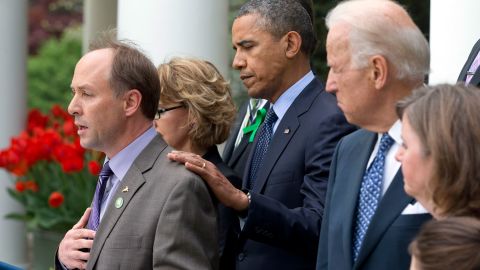
Barden and Hockley returned to Connecticut with a deeper passion for their work.
“If that were to have passed, I think there would have been maybe a sentiment of like, ‘OK, we’re done. We’ve got that fixed,’” Barden said. Recalling the words of fellow gun control advocate Sarah Brady, “‘Sometimes you need a good defeat.’ It kind of mobilizes people, catalyzes people. They know what’s going on. It did for me.”
After studying other mass shootings and gun violence, they developed expansive programming to avert tragedies before they begin. That work has produced Know the Signs, a range of programs that train students and educators to identify, report and respond to behaviors that suggest someone might harm themselves or others.
“100% of school shooters give off warning signs before they carry that out,” Barden said. “What if that person giving off those warning signs were surrounded by people who understood how to look for those warning signs, and then had the training and the tools to actually do something?”
That straightforward premise has yielded profound success. Sandy Hook Promise says it has presented Know the Signs to more than 23,000 schools and 18 million people. The training programs have helped districts and students avert threats of violence in West Virginia, California, Massachusetts and other states — not to mention nearly 2,700 students in need of intervention that the organization has connected with crisis counselors.
From Sandy Hook to Robb Elementary
Hockley credits some of the organization’s success to its early defeat on the Manchin-Toomey bill.
“To fail so quickly was just horrifying to me,” Hockley said. “But when you have a failure, sometimes that makes you look at things in a different way.”
Sandy Hook Promise remains a persistent force in the arena of gun legislation. Barden leads the organization’s policy side and has been active in every major effort for federal gun reform for the last decade.
Sen. Chris Murphy, D-Conn., a leading voice for gun reform, has known Barden’s commitment since he walked off the Senate floor following the universal background check vote in 2013.
“I felt mortified. I felt like a failure. I went out of the chamber and there was a group of the families there,” including Barden, Murphy said. “He said to me something along the lines of, ‘Chris, I’m not an advocate for four months. I’m an advocate for 40 years. This is my child. I’m never giving up.’”
Barden and Murphy have teamed up on countless failed policies over their decade of work together: extended waiting periods, extreme risk protection orders that would remove guns from people in crisis, a requirement on gun manufacturers to incorporate technology allowing only the owner to fire and a repeated pursuit of universal background checks.
“We were building a movement that needed time,” Murphy said. “I gave the same speech a million times over the last 10 years to advocates. I tell them every great social change movement in the country’s history failed a million times before it succeeded.”
In May, another young man armed with an assault-style rifle murdered children in another elementary school, this time in Uvalde, Texas. Once again, the families consoled the new members of a lifelong club as they grappled with their own frustration and grief.
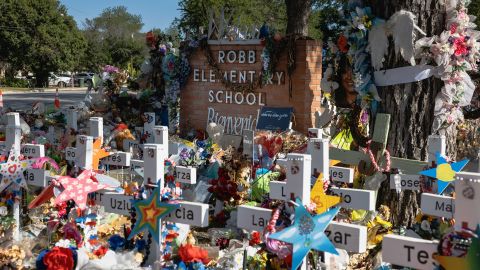
Once again, Murphy took to the Senate floor, begging his colleagues to do anything.
But this time, the “social change movement” was stronger, the gun lobby was weaker and something shook loose. Working with a bipartisan coalition of senators that include Minority Whip John Cornyn, a Texas Republican, Murphy helped pass compromise legislation accepted as the first major federal victory for gun reform advocates in nearly three decades.
Signed by President Joe Biden in June, the law gives authorities 10 days instead of three to conduct background checks on gun purchasers and requires federal agents to ask local law enforcement if purchasers under 21 have a juvenile criminal or mental health history. It also incentivizes states to pass red flag laws like the one Connecticut passed in 1999, the first state in the country to do so.
It’s far from comprehensive and lacks the strength Murphy would have preferred. But he describes the legislation as both the culmination of a hard-fought decade and the opening of a new era in gun policy.
“While this was just the beginning, man, it was a pretty important beginning,” Murphy said.
The long-toiling advocates saw other victories in 2022: In February, insurers for the gun manufacturer Remington Arms agreed to pay $73 million to victims’ families to settle a lawsuit centered on the company’s aggressive marketing of the assault-style rifle used at Sandy Hook.
More important to the families than the payout is access to Remington’s internal communications, including its advertising strategies, and the right to release the documents.
“I’m very much looking forward to understanding what was going on behind the scenes, underneath the veil,” said Barden who, along with the other families party to the suit, plans to release the documents in early 2023.
More recently, a Connecticut judge ordered right-wing broadcaster Alex Jones to pay $473 million in punitive damages to victims’ families and a first responder in a case evaluating damage done by Jones’ repeated lies about the Sandy Hook shooting, including claims that it was staged and the grieving parents were “crisis actors.”
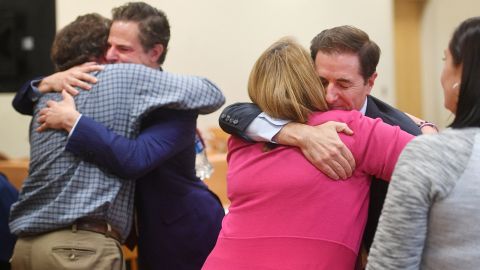
That order increases Jones’ tab across multiple cases to nearly $1.5 billion, a number that the families hope discourages other conspiracy theorists from spreading harmful lies that lead to harassment.
“My focus was getting the truth out there and stopping that bad behavior,” said Scarlett Lewis, a party to one of the cases, whose 6-year-old son Jesse was killed at Sandy Hook. “And I think with bullying behavior, you first try to ignore it, and then when it doesn’t stop, you have to find the courage to stand up to it.”
But for the coalition of parents who have spent 10 years standing up to misinformation, powerful lobbies and the seemingly endless march of American tragedy, victories are simply followed by more work.
Jones has publicly rebuked the idea of paying “any money” to the families he has mocked and vowed to appeal his ruling. Since the bipartisan gun bill became law, 332 people have died in mass shootings in the United States, according to data from the Gun Violence Archive.
But Barden and Hockley show no signs of slowing down. In between their separate interviews for this report, they excused themselves for a conference call. They discussed the guest list for an upcoming gala. They eagerly tended to the details of their no-longer-new and not-by-choice careers, persistently maintaining the momentum they have drawn from the worst day of their lives.
“I used to laugh that we’re going to put ourselves out of business, but there will always be a need for people to feel acknowledged and visible, and to know that there are others around them that are going to be keeping an eye out,” Barden said. “There will always be a need for that, and so there will always be a need for this beautiful little, little project of ours.”
